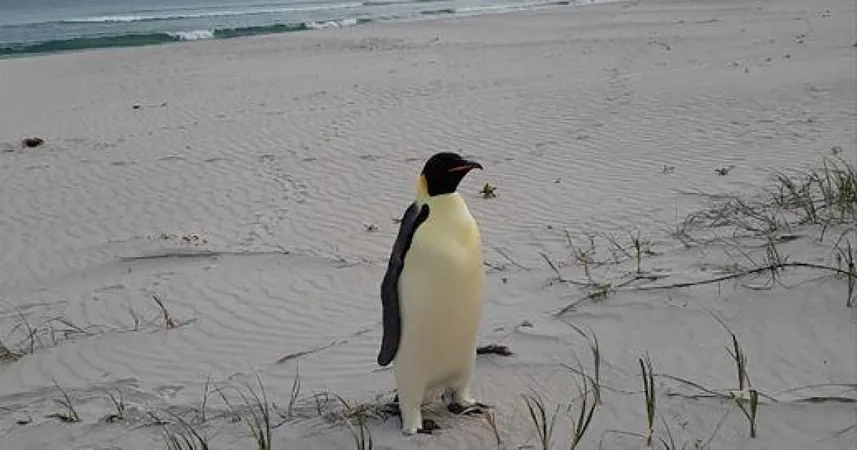
Malnourished Emperor Penguin Bewilders Rescuers on Australian Beach - What Happens Next?
2024-11-11
Author: Ken Lee
Introduction
In a baffling turn of events, a malnourished emperor penguin has been spotted on a popular beach in Denmark, Australia, approximately 2,200 miles away from its natural Antarctic habitat. This unusual sighting has intrigued wildlife experts and sparked a flurry of rescue efforts.
The Discovery
The adult male penguin was discovered on November 1 by local surfer Aaron Fowler, who was taken aback when he saw the towering bird waddling out of the water. Standing at about 39 inches tall and initially weighing only 51 pounds—significantly under the typical weight of over 100 pounds for a healthy male emperor penguin—the bird needed immediate care. "(He) just stood up in the waves and waddled straight up to us," Fowler recounted, detailing the penguin's clumsy attempts to slide in the sand as if it was snow.
Unprecedented Sightings
The penguin's appearance in such a warm climate is unprecedented, as University of Western Australia research fellow Belinda Cannell noted that this is the furthest north an emperor penguin has ever been recorded. Under normal circumstances, these birds typically range around 50 degrees south latitude, whereas Denmark lies at 35 degrees south. The penguin is currently under the care of seabird rehabilitator Carol Biddulph, who is employing various methods to help it acclimate to the unfamiliar environment, including misting it with chilled water.
Potential Causes of the Journey
Experts are puzzled by how this emperor penguin ended up so far from home. Its instinctual navigation may have been thrown off due to climate changes, which are increasingly impacting the natural habitats of many species. The Western Australia Department of Biodiversity, Conservation and Attractions is currently focused on rehabilitating the bird, with discussions ongoing about the possibility of returning it to Antarctica.
The Impact of Climate Change
Emperor penguins face significant threats from climate change. With rising ocean temperatures and the erratic patterns of sea ice cover in the Antarctic, three-quarters of their breeding colonies are at risk. According to the World Wildlife Fund, the diminishing sea ice is critical to their breeding success, as it directly affects their ability to find suitable nesting sites.
Alarming Research Findings
An alarming study from Cambridge University published in Science News confirms that early melting in certain areas poses severe risks to emperor penguin chicks. Ecologist Dr. Birgitte McDonald emphasized the dire implications of changing sea ice patterns: "Emperor penguins—their survival, their ability to reproduce—is 100% tied to having appropriate sea ice."
Conclusion
As the world grapples with the acute impacts of climate change, the plight of this emperor penguin serves as a striking reminder of the immediate threats faced by wildlife. Will the penguin's unexpected journey spark greater awareness and action on climate change, paving the way for a safer future for its species? As rescuers continue their work, the fate of this unexpected visitor is still uncertain—stay tuned for updates on this captivating story.



 Brasil (PT)
Brasil (PT)
 Canada (EN)
Canada (EN)
 Chile (ES)
Chile (ES)
 España (ES)
España (ES)
 France (FR)
France (FR)
 Hong Kong (EN)
Hong Kong (EN)
 Italia (IT)
Italia (IT)
 日本 (JA)
日本 (JA)
 Magyarország (HU)
Magyarország (HU)
 Norge (NO)
Norge (NO)
 Polska (PL)
Polska (PL)
 Schweiz (DE)
Schweiz (DE)
 Singapore (EN)
Singapore (EN)
 Sverige (SV)
Sverige (SV)
 Suomi (FI)
Suomi (FI)
 Türkiye (TR)
Türkiye (TR)